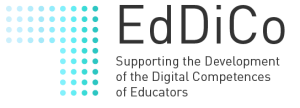Digital Micro-Credentials in Higher Education
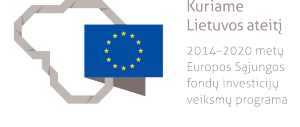
The aim of the project is to describe and create the process of issuing micro-credentials in higher education.
| Project title: | Digital Micro-Credentials in Higher Education |
| Project No: | 13.1.1-LMT-K-718-05-0003 |
| Project coordinator: | Vytautas Magnus University |
| Contact person at VMU: | E. Trepulė, elena.trepule@vdu.lt |
| Project duration: | 22 months (November 2021 – August 2023) |
| Project budget: |
299 988,22 EUR |
The project will be implemented through main activities:
1.To describe the process of integration of micro-credentials into study process through revealing their potential to foster social, economic and higher education innovations, as well as contribution to the sustainable post Covid-19 pandemic recovery;
Output – published scientific article: Tamoliune, G., Greenspon, R., Volungeviciene, A., Tereseviciene, M., Trepule, E., Dauksiene, E. (2023). Exploring the potential of micro-credentials: A systematic literature review. Frontiers in Education. https://doi.org/10.3389/feduc.2022.1006811
2. To describe requirements for the micro-credentials’ implementation process;
3. To adapt the open learning environment to the process of digital micro-credential implementation;
Output – virtual learning environment adapted for issuing micro-credentials https://smartmoodle.vdu.lt/
4. To pilot the process of issuing micro-credentials and to present its potential to foster social, economic and higher education innovations to interested parties, along with the contribution to the sustainable post Covid-19 pandemic recovery.
This project has received funding from European Regional Development Fund (project No 13.1.1-LMT-K-718-05-0003) under grant agreement with the Research Council of Lithuania (LMTLT). It is funded as European Union’s response to the COVID-19 pandemic.
Lecture “The perspective of online study through the eyes of a digitally competent lecturer”
International conference at the Latvian College of Business Administration
Plenary presentation at the Osijek University International Conference
Active Class

The project aims at creating methodology and teacher best practice and scenarios collections that enable teachers in activating students in online classes
| Project title: | Active Class: Activating Students in Online Classes |
| Project No: | 2020-1-PL01-KA226-HE-096358 |
| Project coordinator: | University of Silesia in Katowice (Poland) |
| Contact person at VMU: | E. Daukšienė estela.dauksiene@vdu.lt |
| Project website: | https://us.edu.pl/en/ksztalcenie/projekty-edukacyjne/dla-pracownikow/active-class/ |
| Project run: | 24 moths (March 2021 – February 2023) |
| Project budget: |
214 650EUR |
Project partners:
Project results:
- Flipped classroom based e-methodology
- Teacher training material
- Demo scenarios
- Best Practices Package
- T4E tracks scenarios (prepared by VMU teachers)
Related News
https://studyonline.lt/en/vmu-pas-joined-a-new-project-active-class-activating-students-in-online-classes/
“Active Class” project training on the flipped classroom for active student engagement
Synergies among international projects addressing online teaching and learning challenges
VMU teacher trainings “How to apply ‘flipped class’ methodology for online teaching”
Active Class project multiplier event for T4EU Alliance teachers
DISCO VET

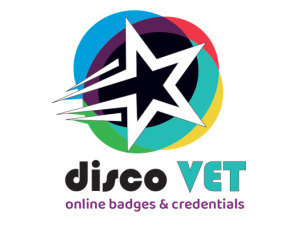
The project aims to come up with a data structure of course and content typology based on current European and national standards and new research. The resulting grid of extra metadata enables a better mapping and manageability of their badges for VET, HE and CPD institutions. Based on the grid, an open source displayer will be developed, accompanied by a 30 hours course on open badges and DSCs targeted to the issuers and validators to support the implementation of the displayer platform in their institutions.
| Project title: | Digitally Signed Credentials and Open Badges in VET and HE |
| Project No: | 2020-1-HU01-KA202-078793 |
| Project coordinator: | Budapesti Műszaki és Gazdaságtudományi Egyetem (Hungary) |
| Contact person at VMU: | A. Volungeviciene airina.volungeviciene@vdu.lt |
| Project run: | 24 moths (November 2020 – October 2022) |
| Project budget: |
263 265EUR |
Partners:
Intellectual Outputs:
- Report on the skills for open badges and digitally signed credentials in the new era;
- Development of open badge displayer;
- Development of the course on open badges;
- Lessons Learned Kit and DISCO platform user guide.
TEDS


The project aims to contribute to teacher education for sustainability (EduS) in different European countries.
| Project title: | TEDS – Teacher education for sustainability. Schools educating for sustainability: proposals for and from in-service teacher education |
| Project No: |
2019-1-PT01-KA201-060830 |
| Project web page: |
http://teds.web.ua.pt/ |
| Project coordinator: | Universidade de Aveiro (Portugal) |
| Contact person at VMU: | A. Volungeviciene airina.volungeviciene@vdu.lt |
| Project run: | 40 months (September 2019 – December 2022) |
Partners:
Outputs:
- Framework for EduS
- Report about of social representations of teachers and teacher educators on EduS
- Multimodal in-service teacher education programs
- Multimodal case studies
- Framework of in-service teacher education for EduS
DIGI-HE


The project aims to develop a self-reflection tool that will help European higher education institutions develop and enhance their strategic approaches for digitalisation.
| Project title: | DIGI-HE a Strategic Reflection Tool on Digitalisation at European Higher Education Institutions |
| Project No: |
612897-EPP-1-2019-1-BE-EPPKA3-PI-FORWARD |
| Project web page: |
https://eua.eu/101-projects/772-digi-he.html |
| Project coordinator: | European University Association (EUA) |
| Contact person at VMU: | A. Volungeviciene airina.volungeviciene@vdu.lt |
| Project run: | 36 months (January 2020 – December 2023) |
| Project budget: |
471,204.00 EUR |
Partners:
Workpackage results:
- Survey on digitalisation at European HEIs.
- Report with results from desk research and survey.
- DIGI-HE technical tool – online platform (interactive tool).
- Guidelines for HEIs to use DIGI-HE.
- Online publication on the DIGI-HE experience.
- Awareness-raising webinars.
DIGI-HE Webinar series: A strategic reflection on digitalisation in higher education
Developing Higher Education Teachers’ Performance (delivered Desk research)
Digitization strategy of the University’s academic activities in Vytautas Magnus University
Workshop: Developing a high-performance digital education ecosystem: institutional self-assessment
VMU professors participated in the workshop DIGI-HE Workshop
Lecture “The perspective of online study through the eyes of a digitally competent lecturer”
International conference at the Latvian College of Business Administration
Plenary presentation at the Osijek University International Conference
ECCOE

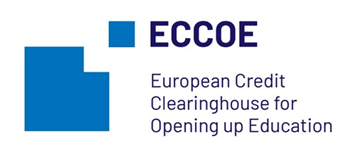
The project aims to support mobility in the European Higher Education Area by developing an “ECCOE-system” for the recognition of digital credentials. The main aim is to facilitate the endorsement and appropriation of open, online and flexible higher education. In support of this overarching objective, the project aims to increase trust in technology-enabled credentials among students, higher education institutions (HEIs) and employers.
| Project title: | ECCOE – European Credit Clearinghouse for Opening up Education |
| Project No: | 2019-1-FR01-KA203-062951 |
| Project web page: | https://eccoe.eu |
| Project coordinator: | Fondation UNIT (France) |
| Contact person at VMU: | A. Volungeviciene airina.volungeviciene@vdu.lt |
| Project run: | 36 moths (September 2019 – August 2022) |
| Project budget: |
449450 EUR |
Partners:
- Fondation UNIT – AUNEGe, France – coordination
- Knowledge Innovation Center LTD, Malta
- Universidad Nacional de Educacion a Distancia, Spain
- Duale Hochschule Baden-Württemberg Heilbronn, Germany
- Politecnico di Milano, Italy
- Vytautas Magnus University, Lithuania
- Vereniging van European Distance Teaching Universities, Netherlands
Activities and outputs:
- Develop quality descriptors for courses, modules, MOOCs and groups of competences;
- Create and validate a Model Credit Recognition Agreement which will be available in 7 languages (DE, EN, ES, FR, IT, LT, NL);
- Set up an online catalogue of over 60 disciplinary and transversal modules which have passed the selection criteria for cross-institution recognition;
- Design a system for technology-enabled credentials;
- Lay the ground for wider take-up via the ECCOE-system network and piloting, by producing and disseminating the supporting documentation that institutional stakeholders need.
National events will take place in the different partner Member States to disseminate the results and involve external stakeholders in ECCOE activities, with the support of public consultations, research papers, online resources and social media.
Expected impact:
- Higher Education Institutions: efficiency, quality, transparency.
- Learners: transparency, mobility, employability.
- Teachers: objectivity of assessment, time-saving.
- Employers: trust in qualifications.
- Policy-makers: systemic vision of the conditions required for the take-up of digital credentials.
Other news:
Synergies among international projects addressing online teaching and learning challenges
EdDiCo
The project aims to empower individual educators to transform and improve their teaching strategies and find the learning opportunities and resources suitable to acquire needed competences.
| Project title: | EdDiCo – Supporting the Development and Certification of the Digital Competences of Educators |
| Project No: |
2019-1-DE01-KA203-005070 |
| Project web: | https://eddico.eu |
| Project coordinator: | Duale Hochschule Baden-Württemberg Heilbronn (Germany) |
| Contact person at VMU: | A. Volungeviciene airina.volungeviciene@vdu.lt |
| Project run: | 40 moths (September 2019 – December 2022) |
| Project budget: |
439 883 EUR |
Partners:
Intellectual Outputs:
- Competence Meta-Model for Digital Educators;
- Learning Maturity Model for Digital Education Competence;
- Directory of Learning Opportunities and Educational Resources for Digital Education;
- Self-Assessment and Recommendation Tools for Digital Education.
Digitally Competent Lecturer and Digitally Competent Teacher
Synergies among international projects addressing online teaching and learning challenges
MicroHE

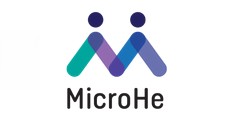
The project aims to provide the most comprehensive policy analysis yet conducted of the impact of modularisation, unbundling and micro-credentialing in European Higher Education.
| Project title: | MicroHE – Support Future Learning Excellence through Micro-Credentialing in Higher Education |
| Project No.: | 590161-EPP-1-2017-DE-EPPKA3-PI-Forward |
| Project web page: | https://microcredentials.eu/ |
| Project coordinator: | Cooperative State University Baden-Wuerttemberg, Germany |
| Contact person at VMU: | A.Volungeviciene airina.volungeviciene@vdu.lt |
| Project run: | 36 moths (December 2017 – November 2020) |
Partners:
- Vytautas Magnus University, Lithuania
- European Distance and E-Learning Network, United Kingdom
- Institut Jozef Stefan, Slovenia
- Tampere University of Technology, Finland
- Knowledge Innovation Centre, Malta
- Fondazione Politecnico di Milano, Italy
- Knowledge 4 All Foundation, United Kingdom
Project activities:
- Gathering the state of the art in micro-credentialing in European Higher Education today, by organizing the first European survey on micro-credentials in HE, surveying at least 70 institutions across the continent, with the aim of understanding the current level of provision, the types of micro-credentials offered and future trends in provision of micro-credentials.
- Forecasting the impacts of continued modularisation of Higher Education on HE Institutions by using forward-scanning techniques, specifically through the use of DELPHI methodology.
- Examining the adequacy of European recognition instruments for micro-credentials, in particular ECTS, the diploma supplement and qualification frameworks.
- Proposing a ‘credit supplement’ to give detailed information about micro-credentials in a way compatible with ECTS, the diploma supplement and qualification frameworks.
- Proposing a meta-data standard and developing an online clearinghouse to facilitate recognition, transfer and portability of micro-credentials in Europe.
VOCAL
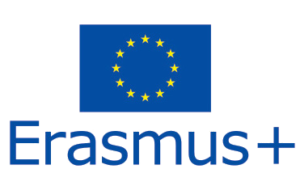

The project aims to foster the open collaboration of HE teachers and VET trainers to design online, open and collaborative learning activities for diverse target groups embedding digital, social, and intercultural competences.
| Project title: | Vocational Online Collaboration for Active Learning (VOCAL) |
| Project No.: | 2016-1-HU01-KA202-022916 |
| Project web page: | http://www.vocalerasmus.eu |
| Project coordinator: | Budapest University of Technology and Economics – BME |
| Contact person at VMU: | A.Volungeviciene airina.volungeviciene@vdu.lt |
| Project run: | 24 moths (November 1, 2016 – October 31, 2018) |
Project partners:
- Vytautas Magnus University – VMU, Lithuania
- Budapest University of Technology and Economics – BME, Hungary
- Baden-Würtemberg Cooperative State University Heilbronn – DHBW, Germany
- Universidad de la Iglesia de Deusto – UDEUSTO, Spain
- Ogres Tehnikums – OT, Latvia
- Lithuanian Association of Distance and e-Learning – LieDM, Lithuania
In order to meet this aim, the partnership will develop training materials and organise face-to-face, week long training events where teachers and trainers will be able to
- develop skills to digitalise quality learning resources, to design online collaborative learning activities embedding digital, social, and intercultural competence development, and to tutor international, intercultural diverse learner groups,
- collaborate designing mutually online and open curriculum for diverse international learner groups, and
- establish open educational practices for future references.
The project will enhance access to training for all through C-VET developing online and open curriculum and empowering teacher and trainer collaboration.
Related news:
ReOPEN


Project aim – to create instruments to develop validated OOL for recognition of prior and non-formal learning.
| Project name: | ReOPEN: Recognition of Valid and Open Learning |
| Project No.: | 2016-1-LT01-KA202-023131 |
| Project website: | http://reopen.eu |
| Project coordinator: | Vytautas Magnus University (http://vdu.lt) |
| Contact person VMU: | A.Volungevičienė airina.volungeviciene@vdu.lt |
| Project duration: |
24 moths (November 1, 2016 – October 31, 2018) |
Project partners:
- Vytautas Magnus University, Lithuaia
- ONECO CONSULTING SL, Spain
- ESCP Europe Wirtschafthochschule, Germany
- Q21, Germany
- University of Zagreb, University Computing Centre – SRCE, Croatia
- European Distance and E-Learning Network (EDEN), United Kingdom
Project results:
- To design a platform for non-formal open learning curriculum (e.g. MOOC) development with learning validation and recognition instruments in place (learner credentials, digital badges, learning path recognition and assessment tools);
- To train T&TT at C-VET organizations, companies, HE institutions and adult learning organizations to:
a. design validated non-formal open learning curriculum (e.g. MOOC or other)
b. apply of digital badges as a new form of digital credentialisation and tracking one’s learning path in non-formal open learning
c. recognize non-formal open learning results in formal curricular; - To exploit the new platform and to design non-formal open learning courses for continuous professional staff developing applying learning recognition instruments for validated non-formal open learning;
- To establish partnership for future collaboration for non-formal open learning recognition (reviewing curriculum in partner institutions and preparing information on potential recognition of open learning).
Related news:
https://studyonline.lt/en/3nd-meeting-in-seville-spain-october-3-4-2017/


